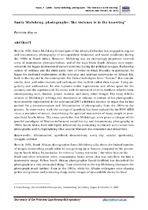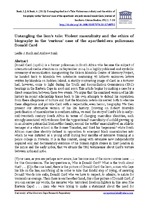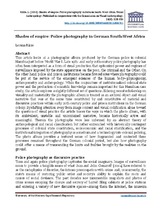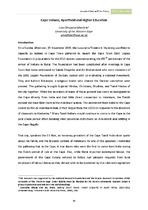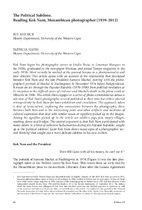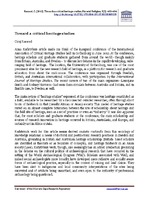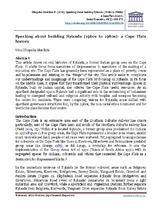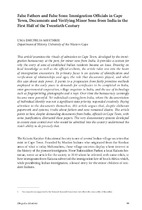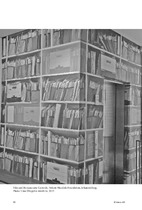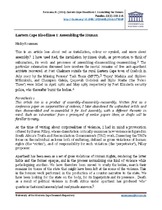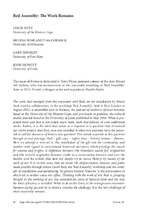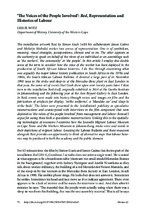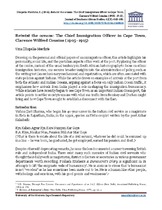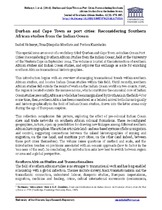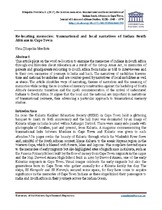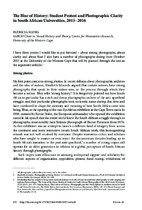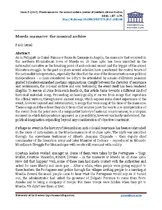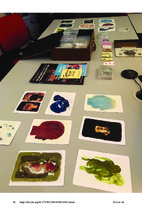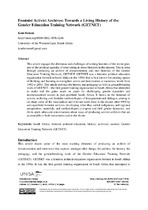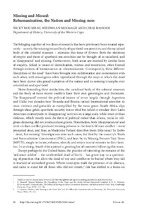Browsing Research Publications (History) by Issue Date
Now showing items 1-20 of 28
-
Santu Mofokeng, photographs: 'the violence is in the knowing'
(Wiley - Blackwell Publishing, 2009)Born in 1956, Santu Mofokeng formed part of the Afrapix Collective that engaged in exposé and documentary photography of anti-apartheid resistance and social conditions during the 1980s in South Africa. However, Mofokeng ... -
Untangling the Lion's Tale: Violent masculinity and the ethics of biography in the 'Curious' case of the apartheid-era policeman Donald Card
(Routledge Taylor Francis Group, 2013)Donald Card (1928–) is a former policeman in South Africa who became the subject of international media attention on 21 September 2004. In a highly publicised and symbolic ceremony of reconciliation inaugurating the ... -
Shades of empire: police photography in German South-West Africa
(Taylor & Francis, 2013)This article looks at a photographic album produced by the German police in colonial Namibia just before World War I. Late 19th- and early 20th-century police photography has often been interpreted as a form of visual ... -
Cape Indians, Apartheid and Higher Education
(University of the Western Cape, 2013)On a Sunday afternoon, 15 November 2009, the Luxurama Theatre in Wynberg was filled to capacity as Indians in Cape Town gathered to launch the Cape Town 1860 Legacy Foundation in preparation for the 2010 events commemorating ... -
The political sublime: reading Kok Nam, Mozambican photographer (1939-2012)
(University of the Western Cape, 2013)Kok Nam began his photographic career at Studio Focus in Lourenço Marques in the 1950s, graduated to the newspaper Notícias and joined Tempo magazine in the early 1970s. Most recently he worked at the journal Savana as a ... -
Towards a critical heritage studies
(Taylor & Francis, 2013)Anna Karlström’s article made me think of the inaugural conference of the International Association of Critical Heritage Studies held in Gothenburg in June 2012. At the conference, heritage scholars and graduate ... -
Speaking about building Rylands (1960s to 1980s): a Cape Flats history
(Taylor and Francis, 2014)This article draws on oral histories of Rylands, a former Indian group area on the Cape Flats. It shifts focus from narratives of dispossession to narratives of the making of a relocation site. The Cape Flats has generally ... -
False fathers and false sons: Immigration officials in Cape Town, documents and verifying minor sons from India in the first half of the twentieth century
(University of the Western Cape, 2014)This article examines the rituals of admission to Cape Town, developed by the immigration bureaucracy at the port, for minor sons from India. It provides a context for why the entry of sons of established Indian residents ... -
Paper regimes
(University of the Western Cape, 2014)In 1915 Baba Bapoo, a store assistant in Cape Town, was thrown into a state of great mental and emotional stress when he lost his permit en route to India. This was the only document that could guarantee his re-admission ... -
Eastern Cape Bloodlines I: Assembling the Human
(Taylor & Francis, 2016)This is an article less about red as installation, colour or symbol, and more about assembly.1 I have used Red, the installation by Simon Gush, as provocation to think of exhumation, its work and processes of ... -
Red assembly: The work remains
(Published by History Department, University of the Western Cape, 2016)The work that emerged from the encounter with Red, an art installation by Simon Gush and his collaborators, in the workshop ‘Red Assembly’, held in East London in August 2015, is assembled here in Kronos, the journal of ... -
‘The voices of the people involved’: Red, representation and histories of labour
(Published by History Department, University of the Western Cape, 2016)The installation artwork Red by Simon Gush (with his collaborators James Cairns and Mokotjo Mohulo) evokes two senses of representation. One is of symbolism, meaning, visual strategies, juxtapositions, silences and so on. ... -
Betwixt the oceans: The Chief Immigration Officer in Cape Town, Clarence Wilfred Cousins (1905–1915)
(Taylor & Francis, 2016)Drawing on the personal and official papers of an immigration officer, this article highlights his personality, social life, and the quotidian aspects of his work at the port. By placing the officer at the centre, instead ... -
Durban and Cape Town as port cities: Reconsidering Southern African studies from the Indian Ocean
(Taylor & Francis, 2016)This special issue arose out of a workshop titled ‘Durban and Cape Town as Indian Ocean Port Cities: Reconsidering Southern African Studies from the Indian Ocean’, held at the University of the Western Cape in September ... -
Re-locating memories: transnational and local narratives of Indian South Africans in Cape Town
(SAGE Publications, 2017)This article plays on the word re-location to examine the memories of Indians in South Africa through oral histories about relocation as a result of the Group Areas Act, to memories of parents and grandparents relocating ... -
The blur of history: Student protest and photographic clarity in South African universities, 2015–2016
(University of the Western Cape, 2017)I have three points I would like to put forward – about strong photographs, about clarity and about blur. I also have a number of photographs dating from October 2015 at the University of the Western Cape that will be ... -
Mueda massacre: the musical archive
(Taylor & Francis, 2017)As in Pidjiguiti in Guiné-Bissau or Baixa de Cassanje in Angola, the massacre that occurred in the northern Mozambican town of Mueda on 16 June 1960 has been inscribed in the nationalist narrative as the breaking point ... -
Mapping Bodies
(University of the Western Cape, 2018)The images in the visual essay that follows this text are drawn from a set of partnered art events, the Museum of Truth and Reconciliation and Double Portrait/Haunting Objects. The latter took place at the University of ... -
Feminist activist archives: Towards a living history of the Gender Education Training Network (GETNET)
(UNISA Press, 2018)This article engages the dilemmas and challenges of writing histories of the recent past, and of the political agendas of intervening in those histories in the present. This is done through producing an archive of documentation ... -
Missing and missed: Rehumanisation, the nation and missing-ness
(University of the Western Cape, 2018)The bringing together of two lines of research that have previously been treated separately – namely the missing/missed body of apartheid-era atrocities and the racialised body of the colonial museum – animates this issue ...

